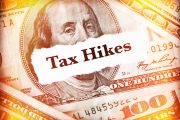
If you accept the old stereotype, you believe that big government is a sworn enemy of big business. You believe that, were it not for Washington’s protection, we’d all be under the boot of rapacious robber barons. In reality, however, the two bigs have far more acquaintance with each other than with the little guy.
Another old stereotype is that Republicans "mainline" corporate money, and they certainly aren’t averse to such a diet. Yet this stereotype is also deceptive. For example, it is well-known that Barack Obama not only received cash from oil giant BP — he was the biggest recipient of it in 20 years. And, as a quid pro quo some say, his administration granted the corporation a waiver freeing it from environmental regulations. BP isn’t alone, either. The securities and investment industry has given the majority of its donations to Democrats during this election cycle, helping the party raise more money than the GOP.
Of course, there is the truism that “money follows power,” but donations don’t tell the whole story. Just consider BP again. As columnist Timothy Carney points out, while the corporation is now being portrayed as a “capitalist tool,” it really has been a big-government fool. For instance, did you know that BP — big, bad, new-environmentalist-bugaboo BP — was one of three oil companies pushing a cap-and-tax scheme with the likes of John Kerry? Carney expands upon the corporation’s statist bent, writing, “While BP has resisted some government interventions, it has lobbied for tax hikes, greenhouse gas restraints, the stimulus bill, the Wall Street bailout, and subsidies for oil pipelines, solar panels, natural gas and biofuels.” And here’s the kicker: One of the taxes BP backed was on gasoline.
But how can this be? I mean, don’t oil companies want to suppress both alternative energy and taxes on their black gold? Well, when you’re a billion-dollar corporation, you can turn anything into gold. Carney explains, “As the nation’s largest producer of natural gas, BP saw many ways to profit from climate legislation, notably by persuading Congress to provide subsidies to coal-fired power plants that switched to gas.” As for the gas tax, he writes that the revenue “would be earmarked for building more highways, thus inducing more driving and more gasoline consumption.”
Of course, this is just common sense. To think an oil company has a monogamous relationship with petroleum is like believing that McDonald’s could make money selling Big Macs but would never consider adding a healthful salad to its menu. Multi-billion dollar corporations have the resources to diversify any way they wish; they can reap profits off green technology as easily as mean technology, off capitalist endeavors or cap-and-tax. They have the lobbying power and deep pockets to extract concessions from the government. It’s the middle class that takes the hit.
And the hit caused by the big government-big business axis can be severe. Just consider the financial crisis, whose proximal cause was large investment banks that made wildly speculative (read: stupid) investments. Why did these institutions — which in some cases had been around for more than 100 years — suddenly forget how to assess risk? The answer is they didn’t.
All responsible Americans have been lamenting Uncle Scam’s billion-dollar bailouts of the last two years. What only few know, however, is that they didn’t start with G.W. Bush but in the 1990s with Bill Clinton’s four big bailouts. First there was Mexico in 1994, then Russia a couple of years later, the Asian financial crisis, and finally Brazil and Argentina. But here’s what even fewer know: These bailouts were actually rescues of big investment banks that, as in the 2000s, had made reckless investments that were going under. And the government not only saved their hides with billions of your tax dollars — it ensured they walked away with big profits.
The above information can be found in the very fine documentary Generation Zero (of which I wrote a soon-to-be-published review), which correctly pointed out that Wall Street firms knew after the Mexican bailout that the federal government would henceforth be there to rescue them via the public coffer. So the message was clear: “Why not roll the dice and become a hedge fund on steroids? If our wildly speculative investments pay off, we become rich; if they don’t, the taxpayers foot the bill anyway.”
This places the 2008 financial crisis in perspective. Many economists say the bailouts were necessary to avoid economic collapse, but even if true, it was only the case because government facilitated gross irresponsibility. Without fear of consequences — with the capitalization of profits and nationalization of risk — Wall Street dug a hole so deep that it threatened to swallow the whole nation. In just the way Uncle Scam can perpetuate a cycle of poverty through welfare, through corporate welfare it perpetuated a cycle of stupidity.
Whatever the details, however, there is a bigger message here: It is a myth that big business loves free markets.
It loves government intervention that stacks the deck in its favor.
Of course, this isn’t hard to understand. People are people, and people like “free” stuff. Thus, to use a variation on a famous quip, the multi-billion-dollar corporation is different from a welfare recipient: It has more money. It has more money to influence politicians and extract government largess, but the desire for the latter is identical.
While this lack of corporate nobility is maddening, never forget that the problem is the people. If we had exhibited more nobility ourselves and abided by the Constitution, there would be little opportunity for the powerful and well-connected to game the system. That is to say, constitutional trespass is now a favorite American pastime. Some people want retirement benefits from the feds because that’s convenient for them, some want food stamps from the feds because that’s convenient for them, others want free medical care from the feds because that’s convenient for them, and yet others want a thousand other convenient federal handouts of taxpayer dollars.
And the corporations want billions of our tax money because that’s convenient for them.
Don’t knock it; they’re simply manipulating an unconstitutional system as many of us do.
They’re just better at securing unconstitutional convenience.
And the die was cast long ago when we established an atmosphere in which we could ignore the Constitution when it cramped our style.
Aside from nobility, we also need to exhibit maturity and not fall for the statist Left’s anti-big-government rhetoric. Liberals maintain power by perpetuating the illusion that there is a great battle between big government and big business and portraying themselves as saviors of the common man. In reality, the relationship between the two is that one dirty hand washes the other with our money — and both hands give the middle class a slap in the face.



